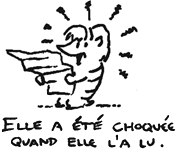 A pronoun is a word used to replace a noun.
It is commonly used to avoid repeating a previously mentioned noun known as the antecedent.
In the following example, pronouns in bold face are used to replace the underlined antecedents.
A pronoun is a word used to replace a noun.
It is commonly used to avoid repeating a previously mentioned noun known as the antecedent.
In the following example, pronouns in bold face are used to replace the underlined antecedents.

 |
Tex a écrit un poème érotique, et puis il l'a envoyé à Tammy. Elle a été choquée quand elle l'a lu. |
Tex wrote an erotic poem and then he sent it to Tammy. She was shocked when she read it. |

The different kinds of pronouns are named according to their grammatical function.

| subject pronouns |
 |
je, tu, il, elle, on,
nous, vous, ils, elles |
 |
I, you, he, she, one,
we, you, they (m), they (f) |
|

| direct object pronouns |
 |
me, te, le, la
nous, vous, les |
|
me, you, him / it, her / it
us, you, them (m) / (f) |
|

| indirect object pronouns |
 |
me, te, lui
nous, vous, leur |
|
to me, to you, to him / her
to us, to you, to them (m) / (f) |
|

| the pronouns y and en |
 |
y
en |
|
there (replaces preposition + location)
some, any, not any (replaces 'de' + noun) |
|

| disjunctive pronouns |
 |
moi, toi, lui, elle, soi
nous, vous, eux, elles |
|
me, you, he, she, one
we, you, them (m), them (f) |
|

| reflexive pronouns |
 |
me, te, se
nous, vous, se |
|
myself, yourself, himself, herself
ourselves, yourselves, themselves |
|

| interrogative pronouns |
 |
|

| demonstrative pronouns |
 |
celui, celle
ceux |
|
this one / that one (m,f)
these, those |
|

| relative pronouns |
 |
qui, que
lequel, laquelle |
|
who, whom, which
which |
|

| indefinite pronouns |
 |
quelqu'un
quelque chose |
|
someone
something |
|
|
 A pronoun is a word used to replace a noun.
It is commonly used to avoid repeating a previously mentioned noun known as the antecedent.
In the following example, pronouns in bold face are used to replace the underlined antecedents.
A pronoun is a word used to replace a noun.
It is commonly used to avoid repeating a previously mentioned noun known as the antecedent.
In the following example, pronouns in bold face are used to replace the underlined antecedents.